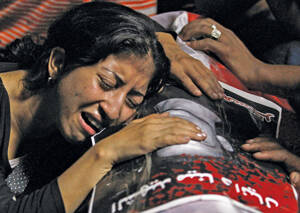Condemning an attack on unarmed Christians in Egypt, Pope Benedict XVI said that during the country’s transition to democracy, all its citizens and institutions must work to guarantee the rights of minorities. At the end of his weekly general audience on Oct. 12, Pope Benedict said he was “profoundly saddened” by the deaths and injuries during the chaos that followed an attack on peaceful protesters on Oct. 9.
At least 26 people—mostly Christians—were killed and nearly 500 were injured as gangs armed with firebombs, sticks, swords and rocks attacked about 1,000 people who had been staging a peaceful sit-in outside the headquarters of Egypt’s state television. As the violence escalated, a speeding military vehicle mounted a sidewalk and rammed into a group of protesters, killing a number of them. The protesters, Muslims as well as Christians, had been calling for greater action to protect Christians in Egypt after a number of attacks had been made against Christian sites. Witnesses said headless bodies lay in the street after the worst sectarian violence since the ousting of President Hosni Mubarak in the Arab Spring revolt earlier this year.
Pope Benedict said Egypt has been “lacerated by attempts to undermine peaceful coexistence among its communities.” Safeguarding harmony and cooperation is essential for a future of true democracy, he said.
Street skirmishes in Cairo continued through Oct. 10, with several hundred Christians pelting police officers with rocks outside the hospital to which many of the victims were taken. In a televised address on Oct. 10, Egypt’s prime minister, Essam Sharaf, blamed the violence on foreign intervention and warned Egyptians that such actions would delay the country’s transition to civilian rule. But the Rev. Rafic Greiche, a spokesperson for the Catholic Church in Egypt, implicated the nation’s governing council in the worst spate of violence since Mubarak’s downfall. He said, “We are accusing the army and the police who used vagabonds, a rabble force of street fighters, to attack the demonstrators.”
Father Greiche said the problem had moved beyond sectarianism: “The army and the police are confronting the Copts. This is the problem.... It is not a Christian-Muslim problem anymore.... People—not just Christians but many Muslims, too—are frightened for the future of our country.”
He added: “Since the fall of Mubarak, the fundamentalists have developed a very loud voice. The government leaves them to do whatever they want.” Father Greiche accused Islamic extremists of using Facebook and other social media to call for Chris-tians to emigrate to the West. He said Islamists were determined to implement Islamic Shariah law in Egypt.
The spark for the crisis was violent protests by hardline Salafi Muslims against the construction of two churches in southern Egypt. Four churches have been subjected to arson attacks in as many months. The Christian demonstrators were protesting one such attack on a Coptic Orthodox church and were seeking greater protection from authorities. Antonios Aziz Mina, the Catholic bishop of Giza, said that Christians are asking to be able to live peacefully in their own country. “If they [the police] had taken a position of being against those who destroyed the churches, we would never have gotten to this point,” he said.
Cardinal Antonios Naguib, the Coptic Catholic patriarch of Alexandria, called the situation “complex.” He said even the armed forces have a dilemma: Do they “face the people creating conflict by [using] force or act very cautiously, giving the impression they are slow and lack resolve?”








